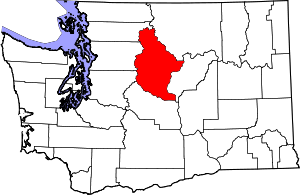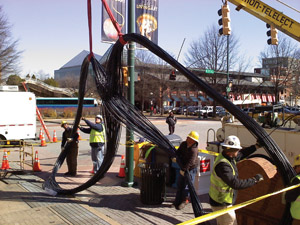
Fast, affordable Internet access for all.

Officials in Chelan County, Washington say they are making meaningful progress on its decades-old plan to deliver affordable broadband to all 79,000 county residents. After securing financing for its latest planned fiber expansion, the Chelan County Public Utility District (PUD) says it’s exploring options to help finish the job of equitable, affordable, full-county deployment.
Chelan County PUD was formed in 1936 by local voters frustrated by costly, spotty access to electricity. Like so many utilities, cooperatives, and communities, those rural electrification efforts have helped inform the quest for ubiquitous, affordable broadband access almost a century later.
In 2001, the Chelan PUD began building a county-wide wholesale fiber network at a time when PUDs in the state were restricted from offering retail telecommunications services. (Those state statutes were rolled back by state lawmakers in May 2021). The network currently covers roughly 81% of the county, reaching about 39,000 subscribers; 21,000 of which get broadband service through one of the county’s five local ISP partners.

An ongoing network expansion plan aims to extend the reach of the county’s fiber network to roughly 42,000 homes and businesses. Those efforts are currently being funded by some of the $14.9 million in American Rescue Plan Act (ARPA) funds received by the county, as well as the Chelan PUD's Public Power Benefit Program, financed by surplus wholesale power sales.
The Chelan County Public Utility District recently approved their budget and, to the delight of residents and businesses in Chumstick, Merry Canyon, and other areas, they included funding to expand the publicly owned fiber network.
Continuing The Growth Process
News of the expansion underscores the increasingly important role high-quality connectivity plays in everyday life. Fiber and Telecom Manager Mike Coleman told the Chelan PUD at its recent meeting that 73 percent of the county now has access to Fiber-to-the-Home (FTTH). He noted that in 2012, average wait time for new installations was 31 days; the utility has shrunk that time down to 11 days. The demand in the past five years has grown and the number of subscribers has grown from approximately 12,000 in 2012 to almost 15,000 today. The PUD expects to reach an additional 1,059 premises in 2018.
“We’ve come so far in the last five years,” says Coleman. “Our goal is to be a world-class fiber transport provider and to facilitate the retail service providers in providing the best possible customer service they can.”
The PUD plans to increase marketing efforts so more residents and businesses know that fiber from the county is an available alternative. Apparently, many residents didn’t realize that the PUD offered the service until this year.
Coverage of the meeting:
It’s no small feat to plan, deploy, and operate a municipal citywide Fiber-to-the-Home (FTTH) network, but communities are doing it. We’ve put together a Citywide Municipal FTTH Networks list and a map, with quick facts at your fingertips. If your community is considering such an investment, this list can offer a starting point on discovering similarly situated locations to study.
The list is divided by state and each state heading offers a description of any barriers that exist and a link to the statute in question. Under each community, we also included relevant links such as to the provider’s website, coverage on MuniNetworks.org, and reports or resources about the network.
We used four basic criteria to put a community on our list and map:
Share the list far and wide and if you know of a community network that meets our criteria that we missed, please let us know. Contact H. Trostle at htrostle@ilsr.org to suggest additions.
When communities decide to proceed with publicly owned infrastructure, they often aim for open access models. Open access allows more than one service provider to offer services via the same infrastructure. The desire is to increase competition, which will lower prices, improve services, and encourage innovation.
It seems straight forward, but open access can be more complex than one might expect. In addition to varying models, there are special challenges and financing considerations that communities need to consider.
In order to centralize our information on open access, we’ve created the new Open Access Networks resource page. We’ve gathered together some of our best reference material, including links to previous MuniNetworks.org stories, articles from other resources, relevant Community Broadband Bits podcast episodes, case studies, helpful illustrations, and more.
We cover:
Check it out and share the link. Bookmark it!
Local news editors seem inspired by the current network neutrality debate at the FCC. Newsrooms considering the prospect of paid prioritization are reassessing the value of municipal networks.
Not long ago, the Olympian ran an editorial offering the basics of municipal networks. Editors mentioned NoaNet, the statewide fiber project that brings access to a series of community anchor insitutions and approximately 260,000 people. The piece also acknowledges that port authorities and some Public Utility Districts (PUDs) offer fiber connections in several regions of the state. We have reported on a number of them, including Benton, Okanogan, and Chelan.
The editorial points out that the cities of Lacey, Olympia, and Tumwater have fiber and conduit they use for government operations. The cities share the fiber and conduit with the state Department of Transportation. The Olympian also notes that if a city wants to provide telecommunications services, its location is critical:
Republican Sen. Trent Lott championed a 1996 bill that prohibited states from blocking any entity that provides telecommunications services. Despite that far-sighted bill, big provider lobbyists have persuaded 20 states to pass legislation making open access difficult.
As suggested by other editors, The Olympian advocates for a municipal approach to curtail damage that will result if network neutrality disappears:
If approved, individual consumers in the South Sound and other U.S. communities can expect slower speeds for smaller services, nonprofits and independent content creators. Why pay for the “HOT” lane, unless traffic is backed up on the main line?
...
 The desire to focus on long term investments rather than rapidly evolving services is a natural reaction given the historic role of local governments in long term infrastructure investments. Fiber certainly fits in that description and as many have noted, the comparison to roads is apt.
The desire to focus on long term investments rather than rapidly evolving services is a natural reaction given the historic role of local governments in long term infrastructure investments. Fiber certainly fits in that description and as many have noted, the comparison to roads is apt.
In the week before Christmas, Mother Nature sent a powerful winter storm to Chelan County in Washington. Hundreds of trees along the south shore of Lake Wenatchee came down, causing extensive electrical and fiber outages. According to the Chelan PUD, most electrical customers have had power restored, but Internet, phone, and TV services dependent on the fiber are still out.
Readers will remember that the PUD held a series of community meetings this past summer to get public input on the future of the fiber optic network. The network suffers from heavy internal debt and, while customers appreciate the service, most opposed increasing electric rates to build out to reach more cusomters. The PUD decided to keep the network as is with no major expansion.
Following the storm, the PUD announced that it would not rebuild the fiber network due to the heavy replacement cost of up to $750,000. Officials planned to replace the fiber line with a wireless network that would cost between $175,000 and $225,000. Only a small percentage of the homes on the lake's south shore are occupied year round.
According to Christine Pratt of the Wenatchee World, the decision rankled residents who have come to depend on the fiber for more than just email. There are more than just a few property owners who run businesses out of their homes. The wireless option was not well received:
“A lot of people up here think that we’ve been thrown under the bus,” says longtime resident George Wilson, one of many south-shore residents who lobbied for years to get the PUD to put the fiber in. “I’ve never, ever seen a utility just walk away from an established, essential service. Wireless is a huge step backward.”
...
Bob Hooson runs an employment recruiting businesses from May to October from his Lake Wenatchee home. He spends winters working in California.
"I'm on the Internet all day," he said. "Our business requires pulling a lot of resumes down off the Internet and communicating with a lot of people at once. I'd be dead in the water without it. We have built our business based on the fact that we have fiber technology available to us. Wireless is not fast enough."
As we reported in March, the Chelan County, Washington PUD was seeking input from the customer-owners of their open access fiber optic network to decide what the future would hold. The PUD had considered three options and presented them to the public:
• sell the network
• maintain ownership of the network, but improve operations and curb expansion until it is self-sustaining over time
• continue expanding the network, paying for the expansion by increasing electric rates
After requesting public comment through outreach and community meetings to present information and hear public opinion, the Chelan PUD General Manager John Janney released the recommendation to the PUD Commissioners at an April 9th special meeting. From the press release:
After feedback from customer-owners and extensive analysis around potential alternatives, costs and benefits, General Manager John Janney recommended Monday night that Chelan County PUD continue operating its fiber-optic network and take steps to put it on more stable financial footing before considering any further expansion to unserved areas. The network now offers access to about 70 percent of the county.
On April 16th, the Commission endorsed the recommendation. From the press release:
"It's a way forward," said Commissioner Dennis Bolz in speaking in support of the resolution that outlines steps to be taken to move the fiber system toward being self-sustaining and ending its reliance on dollars from the PUD's overall electrical system. He likened it to commencement that many seniors regard as the end to their high school days but which is really the beginning of their adult lives.